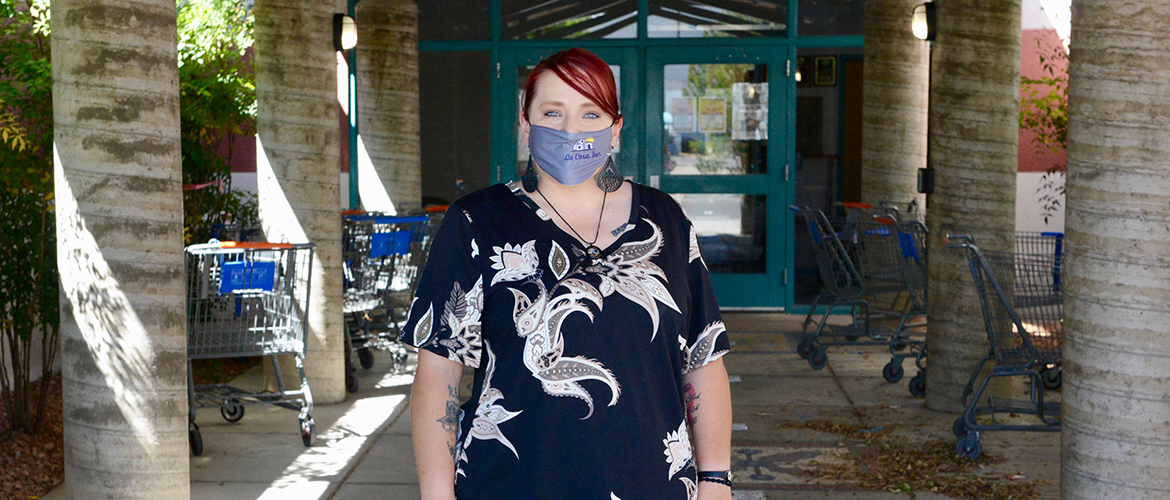On any given day, the domestic violence shelter at La Casa, Inc. in Las Cruces is usually at capacity. When the COVID-19 pandemic hit, the emergency shelter, which houses up to 83 people, was full. And the calls for help kept coming.
“We’ve seen a surge in domestic violence crisis calls,” said Henry Brutus, executive director at La Casa. “It’s been a tough time for a lot of people.”
As a result, La Casa staff had to quickly find new ways to provide shelter for people escaping domestic violence, especially when public health orders limited capacity for emergency shelters. La Casa began working with organizations in the community, including hotels, to provide a safe place for victims to stay.
La Casa had to address many other unforeseen challenges, which resulted in unexpected costs for the organization — introducing new sanitizing protocols, providing personal protective equipment for staff on the ground, obtaining technology to accommodate remote work arrangements for staff and virtual services for clients, and everything in between. All these efforts led back to one critical goal: to continue supporting people impacted by domestic violence.
To help La Casa address these needs, Blue Cross and Blue Shield of New Mexico (BCBSNM) awarded the organization a $10,000 grant through its COVID-19 Community Collaborative Grant Fund. Most of the funding went to covering hotel nights and providing needed items, such as towels, shampoo and other supplies for victims of domestic violence. During the first month that La Casa used hotels for shelter amid the pandemic, the organization helped 13 families through their stay with the funding provided by BCBSNM.
“The funds from BCBSNM provide hope to La Casa, Inc.,” Brutus said. “In a time of chaos and despair around the world, BCBSNM gives us a lifeline, which signals that in a time of isolation and quarantine, there are still wonderful and caring people who care about those around them and want to stay connected.”
Domestic violence in New Mexico
For many New Mexicans, home is not a safe place. More than 19,200 domestic violence incidents were reported to New Mexico law enforcement in 2017, as stated in the Incidence and Nature of Domestic Violence In New Mexico XVII. And this figure doesn’t include the many cases of domestic violence that go unreported.
According to La Casa staff, the stay-at-home orders during the COVID-19 pandemic left victims of domestic violence and abuse especially vulnerable. Many victims were essentially stuck at home with their abusers while dealing with added stress from job loss or furloughs, homeschooling children, and other challenges — all stressors that have the potential to exacerbate abuse.
The need for services to protect people from domestic violence — which can include physical, verbal, emotional, financial and other types of abuse — is essential.
“Domestic violence is pervasive in our communities,” said Bryana Valdez, La Casa shelter director. “It’s important that we’re able to still provide safety to individuals, no matter how their situation may have changed.”
A comprehensive approach
In addition to emergency shelter, La Casa offers a wide variety of non-residential services to support victims of domestic violence. The organization’s civil legal services assist survivors with protective orders, court appearances, custody agreements, immigration and other areas. La Casa also provides counseling, a transitional housing program, education on preventing domestic violence, and much more.
During the COVID-19 pandemic, La Casa’s non-residential case managers have provided education sessions over the phone and a remote support group for clients.
Whatever the needs of people impacted by domestic violence — whether it’s emergency shelter, education, legal advocacy or someone to talk to — La Casa is there to help.
“La Casa has open doors for anybody who needs assistance,” said Norma Bustamante, non-residential services manager at La Casa. “We are here to empower the survivors.”
The power of support
When La Casa announced that they would stay open during the COVID-19 pandemic to continue to provide emergency shelter and services, donors and volunteers were eager to help. One community member took a special trip to the store to purchase needed supplies for clients at the shelter. A donor gifted tablets for children at La Casa so they could continue their schooling online when schools were closed due to the pandemic. Volunteers worked on projects to support La Casa from home, and more people expressed interest in volunteering.
“I can’t put into words how grateful I am that grants continue to be awarded, donors continue to donate, and volunteers continue to volunteer,” said Pamela Strobbe-Cisneros, event and volunteer coordinator at La Casa. “It’s been awe-inspiring.”
The additional need for domestic violence services is likely only beginning.
“Unfortunately, domestic violence doesn’t have an end in sight,” said Strobbe-Cisneros. “I think we’re going to see a flood of calls as more and more restrictions are lifted because sometimes victims have a hard time making that phone call with an abuser standing right there.”
If you are experiencing domestic violence or concerned about someone you know, Brutus recommends reaching out to La Casa. Its crisis line is available 24/7 at 575-526-2819 or 1-800-376-2272. For more information and resources, visit www.lacasainc.org.
You can also call the 24/7 National Domestic Violence Hotline at 1-800-799-SAFE (7233) or visit www.ndvh.org. If you need emergency care, call 911.

